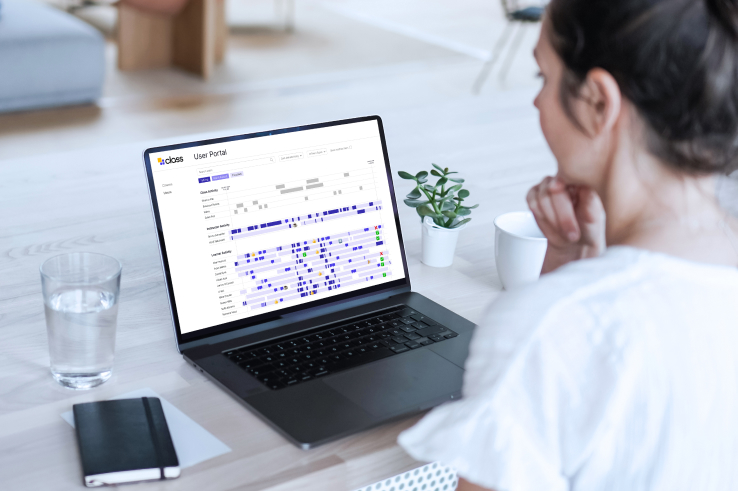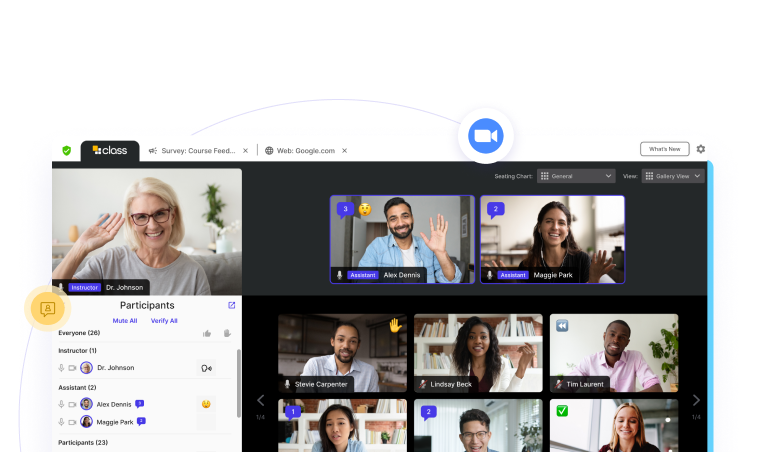
Mike Lovell is the SVP of Marketing at Class. He has dedicated his career to technology and the applications that can innovate the way people live and learn.

Mike Lovell is the SVP of Marketing at Class. He has dedicated his career to technology and the applications that can innovate the way people live and learn.

For Monash Virtual School's Faculty, learning analytics has become a foundational part of how teacher education is delivered, evaluated, and continuously improved.
When Class was recently recognized with an award for innovation in learning analytics, it served as a reflection of how institutions like Monash are turning data into actionable insights that support better teaching and learning.
“We wanted to be able to support our pre-service teachers in not just being able to reflect,” says Michael Phillips, Professor of Digital Transformation at Monash, “but also to reflect with evidence.”
Post-lesson reflection has long been a staple of the Monash Virtual School teacher education program. But without access to real-time data, those reflections were largely anecdotal and based on memory or “gut instinct” rather than observable patterns.
“Those conversations used to be informed by people’s subjective feelings, their guess as to how things were going in lessons,” Mike explains. “We really needed to have a more nuanced and sophisticated way of understanding what was going on in the classroom.”
This made it difficult for teacher educators to help pre-service teachers understand the actual impact of their instructional decisions, or to reliably guide their growth over time.
With Class’s data portal, Monash introduced a new layer of visibility into their instructional process. The platform’s learning analytics give faculty and pre-service teachers access to granular data, including talk time, participation trends, engagement signals, and chat activity from live sessions.
“After every class, the pre-service teachers spend time with us [faculty] debriefing and reflecting on their teaching practices and the learning outcomes that they think that students have been able to achieve as a consequence of their lesson,” Mike shares.
For example, a pre-service teacher might feel a lesson fell flat, only to later see that student participation in chat and breakout rooms was higher than expected. Instructors may find that a particular activity generated a surge in engagement, as shown through reaction data or talk time. These insights can correct false impressions and build teacher confidence, especially for educators still developing their classroom instincts.
Another example: an instructor might believe they provided equal opportunities for student input during a group activity. However, a review of participation data could reveal that most contributions came from just a few students, while others remained passive. With this insight, the instructor could revise the activity design to include smaller breakout rooms or structured turn-taking to foster broader engagement.
By anchoring reflection in data, educators can go beyond general impressions and start identifying patterns—both what’s working and what may need adjusting. That leads to more specific goal-setting and a clear path for instructional improvement.
For Monash Virtual School, this shift from “how it felt” to “what the data shows” is shaping a new model for instructional coaching and professional growth.
“With Class, we're able to have data-informed conversations rather than just subjective ones about how they feel their class went and what kinds of pedagogical goals they might set themselves the next time they go to do this work,” says Mike. “Class enables us to support teachers and teacher educators in reflecting on what happened, understanding why it happened, and then planning what to do next.”
This feedback loop helps instructors identify successful practices and explore new strategies. Instructors and pre-service teachers now analyze lesson outcomes based on actual student behavior—like who was participating, when, and how. That kind of visibility enables more responsive planning and targeted interventions.
“We’re using the data to trial different pedagogical approaches and see which ones are actually improving student learning outcomes,” Mike explains. “What we’ve seen is that when teachers reflect with evidence, their professional learning is far more targeted and impactful.”
The impact of this approach is measurable. Monash Virtual School has seen statistically significant improvements in the online teaching capacities of its pre-service teachers, as well as growing self-confidence among students attending Monash Virtual School courses.
“From students who complete pre- and post-class surveys, we know that they have an increased self-confidence as a result of attending Monash Virtual School classes,” Mike says. “And a huge amount of that is because of the features and the ways in which Class is able to represent content for them.”
These instructional changes are supported by a broader, ongoing process of goal-setting and reflection, anchored by access to meaningful, timely learning analytics.
“We know that the use of Class has led to statistically significant changes in online teaching capacities,” Mike concludes, “and we anticipate that that's only going to grow into the future.”
Winning an award for innovation in learning analytics is an exciting milestone for Class, but the real story is how educators like those at Monash Virtual School are using that innovation to improve teaching and learning in measurable ways.
Their work shows how learning analytics can shift professional learning from abstract reflection to actionable improvement. With the right data at the right time, teacher education becomes more intentional, focused, and impactful. “That kind of immediacy of data is really powerful,” Mike concludes. “It allows us to intervene earlier and support students and teachers more effectively.”
Want to learn how learning analytics can transform instruction and professional development at your institution? Request a demo of Class today.

Mike Lovell is the SVP of Marketing at Class. He has dedicated his career to technology and the applications that can innovate the way people live and learn.

Mike Lovell is the SVP of Marketing at Class. He has dedicated his career to technology and the applications that can innovate the way people live and learn.
Get our insights, tips, and best practices delivered to your inbox

Sign up for a product demo today to learn how Class’s virtual classroom powers digital transformation at your organization.

The class advantage
use cases
Features
Products
Integrations